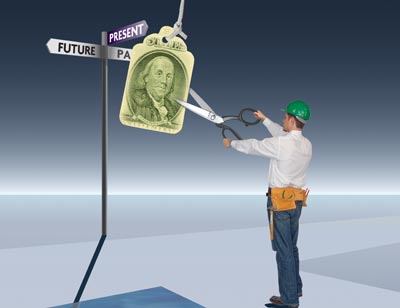The industry has made it through another year in the wringer. And though some areas report increases in activity, one sign of this economy has not gone away — price competition.
In fact, in a recent survey, the Top 50 Builders overwhelmingly named lowball pricing as the mistake most often made by their competitors right now.
Still, many of the Top 50 say they’ve had to lower their prices more than they ever expected. Others are standing firm with little to no discounting.
Whichever side of the fence they fall on, these builders all say their pricing decisions are not made in a reactionary way, but rather are part of a larger strategy.
Here, a handful of Top 50 Builders discuss their approach to confronting the price wars.
In the game
When the price competition first hit, many Top 50 Builders would not lower their bids by more than a few percentage points. Now some say they do.
“Our company is really unfortunate in that we’ve had to change our tune … because other builders have forced this issue,” says Tim Murphy, CEO of Presidential Pools & Spas in Gilbert, Ariz. “It’s unfortunate. It’s not good, it’s not healthy.”
Some may even price certain pools for little or no profit, albeit reluctantly. For them, it’s a matter of survival. Builders like Murphy say they regret the reality of the situation, but that they have no choice. They’re almost apologetic, and look forward to a time when they don’t have to go so low.
Others won’t equivocate or apologize. Before the recession, Michael Giovanone’s company specialized in high-end vinyl-liner pools. But now there aren’t enough of those jobs to keep his staff busy, so he’s had to change his approach. And he believes he’s done the right thing.
“I am in the game,” says Giovanone, owner of Concord Pools & Spas in Latham, N.Y. “Ninety-nine percent of the time this year, we’re in the game, and we’re in the game of a product that we’ve never had before. You do what you have to do.”
One builder who has been relatively controversial in Florida credits an aggressive pricing strategy and intensive marketing with helping his company not only stay afloat but thrive in a brutal market.
Five years ago, Holland Pools and Spas of Altamonte Springs worked only with home builders. When the Florida housing market bottomed out, the firm had to change its strategy fast. Company president Michael Holland put tens of thousands of dollars into marketing, and even advertised an $18,000 pool, to the astonishment of local builders. It was clearly a loss leader, and most customers would buy a more expensive model anyway, Holland says. But it helped him gain market share and expand throughout the state. Now, he says, he’s in a position where he no longer has to price so low.
Regardless of the builders’ attitudes about pricing, they all agree on one thing — it isn’t done haphazardly.
“Last year, a lot of people were in a panic stage and didn’t know what they were pricing,” Giovanone says. “They sort of priced things until the customer’s head started going from shaking no to shaking yes, and then they figured out how to make it work.”
Now it’s different. Pricing is done deliberately and strategically. It’s not about bringing in a few bucks in a panic to keep the lights on. Instead, these builders are trying to increase market share or make specific sales goals.
For one thing, they aren’t pricing every pool at little to no profit. Margins can span from single-digits to 30 percent, depending on the job, so they average out to a specified level. If a particular project is especially difficult, or if the company is in a better position for the moment, a builder might stand his ground and insist on a decent profit. If another job is simpler, or the firm is struggling to meet its dig minimum, the number might be more flexible.
But the point, builders say, is that it’s not done in a panic, but in a controlled manner.
Before he decides to offer a deep discount, for instance, Murphy makes sure he knows exactly what he’s signing up for. “We’re costing out every job down to the penny to determine if we want to take these jobs or not,” he says.
Giovanone found a way to get the best of both worlds. He needed to compete in the lower-priced market, but felt strongly about maintaining the price integrity of his core, high-end line. Once that market picks up, he doesn’t want customers to expect a premium, custom pool at cookie-cutter prices.
To do this, he created an economy line. Not only does it attract the budget-conscious crowd, but it gives his company more wiggle room when it comes to price. Some of these pools, he freely admits, generate very little profit. But they help his company survive. “I think it’s clear that most pool dealers right now would cut their margins to almost a break-even, get-to-tomorrow point level because, regardless of what your margins are, unless you get to next year, it really doesn’t matter,” Giovanone says.
While some might consider pricing so low to be short-sighted, Giovanone and Holland insist they have the future in mind.
Winning a bid opens the door to a longer relationship in the future, Giovanone says. “If I break even on a pool at $25,000, you’re going to say, ‘Well, there’s no margin in that,’” he says. “I’ll debate that. Perhaps [there’s] no current margin, but there’s a future margin, because for every dollar that someone spends on a new-pool purchase, in 10 years they will spend 60- to 70 cents in aftermarket service, product and repair.”
Holland also looks at the opportunities that open up every time a customer signs on the dotted line.
“If you take a job for 5 percent [profit], and then you give them the same job that you would give a customer that you’d get 30 percent on, what’s going to happen? You’re going to get one or two referrals from that customer,” he says. “People don’t look at a sale as their future or their security. They look at it just for that one sale.”
Standing firm
While some builders may say they’re lowering their prices to gain market share and secure their positions, there is another camp that simply refuses to offer deep discounts.
“I don’t want to sell 20 pools a month, where 10 of them will produce bad margins and are going to be more headaches … that’s not what we want to do,” says Ken McKenna, president of Tampa Bay Pools in Brandon, Fla. “When you put more pools in the ground, that’s more service calls, more warranty. Every time you drive to that job, it’s costing you money.”
These builders don’t believe you can make up for deep discounts by selling more. “You can sell all the volume you want,” McKenna says. “At some point you have to make money.”
Others have simply had enough of the price wars and don’t want to play anymore. “The theory we had the last three years was break even,” says Art Allen, president of A&G Concrete Pools in Fort Pierce, Fla. “I’m at the point that if I’m going to go another year of break-even, I’m going to go home and watch Oprah. I’m not going to do it anymore. I’m here to make a profit.”
For some of these builders, the concern goes beyond their own company to that of the industry overall. In the short term, agreeing to build pools for little to no profit places downward pressure on all asking prices, they say. This means that over time, when builders want to make a decent profit, they might find themselves in an uncomfortable position.
“Customers have expectations and [may] feel they’re being taken advantage of, when they’re not,” says Debra Smith, president of Pulliam Pools in Fort Worth, Texas.
The good news is that some builders report not lowering their bids because they feel they don’t have to at this point. They’re able to get enough business at the prices they want, partly because they see consumers focusing less on the bottom line and more on quality and value.
“You have two extremes,” Smith says. “One, the people who are going to save a buck and go with someone cheaper, regardless of the possible consequences. And the others who say, ‘With this economy, I want to make sure I’m going with a company who’s going to be there afterwards.’ So we’re benefiting from that end of it.”
Part of this attitude may spring from media coverage of companies that have gone out of business. Allen believes this has sufficiently scared many consumers away from the lowest bidder.
And if they’ve forgotten about the homeowners left with unfinished holes in the ground, he will remind them. “I found out that bad media is actually good for a reputable company,” he says.





